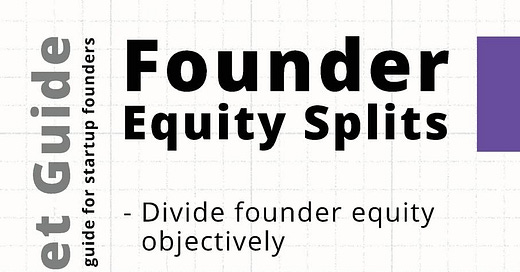How to Split the Equity Among the Founders
This Friday -> "Founder’s Pocket Guide: Founder Equity Splits" by Stephen R. Poland [3 min reading]
On Startup Salad I break down a business book’s key takeaways in a simple, digestible format, just like a good salad!
Hey, it’s Fede!
When I started my first startup, I was young and inexperienced, which led to many mistakes, like rewriting the document about equity percentages five times.
I created this quick guide to help others avoid the same mistakes and save time, money, and frustration.
For this very specific topic, Stephen R. Poland is the go-to expert for a quick overview. Check out his book: "Founder’s Pocket Guide: Founder Equity Splits".
Here is a quick guide based on the book (with the addition of some personal insights):
Why is it important?
Who owns the equity in a startup is essential for several reasons:
It provides control of the startup
It can motivate the founders
It can attract talent by offering incentives beyond just a salary
It helps secure funding for the startup
Since a startup can have many stakeholders holding equity, it’s crucial to carefully structure the founding team from the very beginning.
As you begin your entrepreneurial journey, it’s important to identify the founders and decide how much equity each should receive.
Who are the founders?
This question is easy when there are only one or two founders, but it becomes trickier when there are three or more.
The recommendation here is to take the Founder Test, which consists of 5 “yes or no” questions. This test should be done by all potential founders.
Here are the questions:
Agreement: Do the other founders consider you a founder?
Relationship: Have you had prior collaborations with the other founders?
Full-time commitment: Would you work full-time on the startup?
Sacrifice: The opportunity cost of working on this startup is high?
Skills: Are your skills essential and hard to find?
I recommend putting the results (all the yes and no) in an Excel sheet and comparing the answers between the potential founders. This will give you a clearer overview of who truly fits the role of a founder and if there is balance among the team members.
Based on these results, you’ll be able to identify who should become a founder and start to have a better idea of how to divide the equity. We’ll discuss this last point in more detail in the next step.
How many shares for whom?
Let’s clarify this: having everyone with the same amount of shares is not bad per se. It can help keep everyone equally committed, but it may cause problems in case of conflicts.
One solution is to split the shares equally, but reserve 25% as bonus equity. These bonus shares go to founders who contribute more value to the project and to determine who deserves them, ask the founders these questions (adaptable to your project):
Previous founder experience with successful startups?
Successful exits in the past?
Closed funding rounds in the past?
Have you deposited any patents?
Do they have important technical skills for the startup?
Do they have sales expertise in the industry?
For each of these areas, if a founder meets the criteria, assign points. Then, allocate the 25% bonus shares based on the points each founder has earned.
With this approach, you reward the most deserving founders with more equity.
Vesting: What’s That?
Be cautious, especially if a founder didn’t join the startup since the very beginning. Giving away equity too quickly can be risky, as a founder might take equity and, for various reasons, later leave the project, still holding a large portion of the startup.
This is why the vesting mechanism exists, which allows equity to be granted over time (typically 4 years).
Important: there are 4 types of vesting:
Time-based vesting: Equity is granted periodically (typically at the end of each year).
Milestone vesting: Equity is granted based on reaching specific goals.
Vesting acceleration: Equity is granted when the startup is acquired.
Mix: Combines the previous types with different formulas.
The topic of vesting is as interesting as it is complex. Personally, I would recommend consulting a skilled lawyer before setting up a vesting plan.
This is especially important because the timing of vesting can affect the taxes you’ll need to pay.
Anything else that you think should be mentioned? Let me know!
See you next Friday,
Federico Lorenzon











great post ✌️